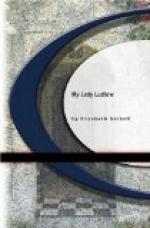When my lady returned again, she sat down and began to talk of Mr. Gray.
“Miss Galindo says she saw him going to hold a prayer-meeting in a cottage. Now that really makes me unhappy, it is so like what Mr. Wesley used to do in my younger days; and since then we have had rebellion in the American colonies and the French Revolution. You may depend upon it, my dear, making religion and education common—vulgarising them, as it were—is a bad thing for a nation. A man who hears prayers read in the cottage where he has just supped on bread and bacon, forgets the respect due to a church: he begins to think that one place is as good as another, and, by-and-by, that one person is as good as another; and after that, I always find that people begin to talk of their rights, instead of thinking of their duties. I wish Mr. Gray had been more tractable, and had left well alone. What do you think I heard this morning? Why that the Home Hill estate, which niches into the Hanbury property, was bought by a Baptist baker from Birmingham!”
“A Baptist baker!” I exclaimed. I had never seen a Dissenter, to my knowledge; but, having always heard them spoken of with horror, I looked upon them almost as if they were rhinoceroses. I wanted to see a live Dissenter, I believe, and yet I wished it were over. I was almost surprised when I heard that any of them were engaged in such peaceful occupations as baking.
“Yes! so Mr. Horner tells me. A Mr. Lambe, I believe. But, at any rate, he is a Baptist, and has been in trade. What with his schismatism and Mr. Gray’s methodism, I am afraid all the primitive character of this place will vanish.”
From what I could hear, Mr. Gray seemed to be taking his own way; at any rate, more than he had done when he first came to the village, when his natural timidity had made him defer to my lady, and seek her consent and sanction before embarking in any new plan. But newness was a quality Lady Ludlow especially disliked. Even in the fashions of dress and furniture, she clung to the old, to the modes which had prevailed when she was young; and though she had a deep personal regard for Queen Charlotte (to whom, as I have already said, she had been maid-of-honour), yet there was a tinge of Jacobitism about her, such as made her extremely dislike to hear Prince Charles Edward called the young Pretender, as many loyal people did in those days, and made her fond of telling of the thorn-tree in my lord’s park in Scotland, which had been planted by bonny Queen Mary herself, and before which every guest in the Castle of Monkshaven was expected to stand bare-headed, out of respect to the memory and misfortunes of the royal planter.
We might play at cards, if we so chose, on a Sunday; at least, I suppose we might, for my lady and Mr. Mountford used to do so often when I first went. But we must neither play cards, nor read, nor sew on the fifth of November and on the thirtieth of January, but must go to church, and meditate all the rest of the day—and very hard work meditating was. I would far rather have scoured a room. That was the reason, I suppose, why a passive life was seen to be better discipline for me than an active one.




